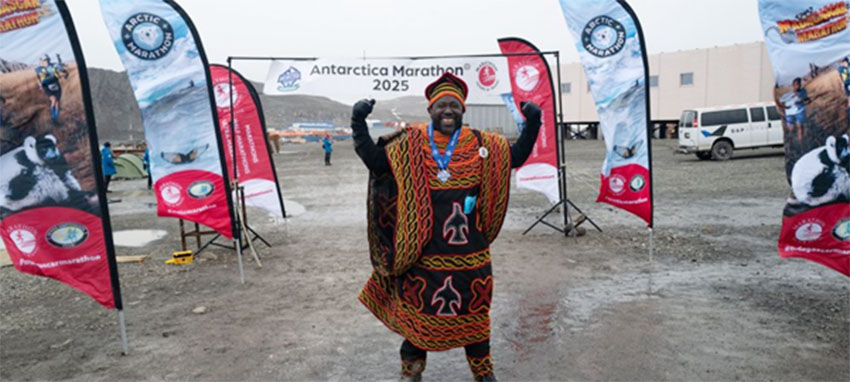A US-based Cameroonian athlete, Afowiri Fondzenyuy, best known as the Toghu Marathoner, has completed the Antarctica Marathon, one of the most challenging marathons in the world, in a remarkable time of 6 hours, 52 minutes, and 47 seconds.
Fondzenyuy, known as the Toghu Marathoner, braved extreme cold, relentless winds, and a rugged, icy terrain to finish his 19th marathon on his sixth continent. Afowiri’s exploits have been so impressive that it warranted his Fon, the Fon of Nso to knight him Nformi ‘Kileh’. Kileh is a Nso word for running.
Despite battling harsh conditions, Fondzenyuy’s determination and resilience saw him through to the finish line. Notably, he ran in traditional Cameroonian attire, Toghu, which added to the challenge due to the freezing temperatures. “At some point, I felt like I was carrying a suit of armour,” he said. “The cold had turned my Toghu into something almost unmovable, but I kept pushing.”
However, Fondzenyuy’s achievement goes beyond personal glory. He undertook this marathon to raise awareness and funds to build a school for children with special needs in Cameroon, particularly those with autism. “This is more than running—it’s about making a difference,” he said. “Every step I take is a step closer to building a future for children who deserve the best education and opportunities.”
Having already earned a Guinness World Record in Tokyo for completing the Abbott World Marathon Majors while running in Toghu, Fondzenyuy’s efforts are geared towards making a positive impact on his community. With this achievement, Fondzenyuy is one continent away from completing the prestigious Seven Continents Marathon Challenge.
Fondzenyuy’s dedication to supporting children with autism and promoting special needs education in Cameroon is commendable. “Quitting was never an option,” he said, reflecting on the challenges he faced during the marathon. “I knew that every step I took was not just for me, but for the children who will benefit from this effort.”
As Fondzenyuy continues to push boundaries, his story serves as an inspiration to runners and change-makers alike, highlighting the power of sports to drive social change. His next challenge is eagerly anticipated, but for now, he remains focused on his mission to build a brighter future for children with special needs in Cameroon.
On what inspired him to tilt focus to refocus to helping children with special needs, especially autism, Afowiri told The Post: “My first name, Afowiri, means, giving, and we have this thing in our culture that when you give a child a name, the child character is built around that name, and for some reason, Afowiri really matches with my personality, ‘extremely giving…when I went to school, I didn’t know anything about social responsibility. So when we started a project, and they said go out and build something around social responsibility, I got a soccer ball from here, and sent it to my uncle to send it to a school that my father went to, C.S. Ngondzen.
“The children got this ball, and it inspired them, and they won the Regional Championship for the first time. I was so confused that $50 could have such a great impact, and that’s where my non-profit journey started, and I decided to make it official.
“In terms of children with basic education, as I said earlier, if not for the intervention of my parents. My dad was extreme, my mom an educator. My dad was somebody who basically used to be on top of me. I don’t think I would have been here today. I started talking at the age of six. I was a late reader. Those things that impact Early Education are the key. If a child cannot read or write, they cannot function in any. It starts from the basics.
“From the basics, a child has to be able to read and write because through books you’ll be able to discover the world that loves. A lot can be discovered through reading. So, that’s why I’m so passionate about children being able to read and write. That’s where part of the inspiration came from, because if I didn’t have a very solid intervention from my parents, I think I would have been a functional illiterate,” he said.
On his choice of using his unique Toghu attire to showcase his cultural heritage, Afowiri said it is working a lot, as many people have come to know about the attire as well as his charitable works done from funds raised from his Toghu marathons. Though running now without a sponsor or partner, Afowiri says it will be great to have one, and that he is opened to having one, given that it will give him room and resources to continue his works and programmes for children with special needs.
On the attention and publicity he brings to the Toghu attire through his marathons, Afowiri said, “There is no better way to see a city other than on foot. You know all the little halls and the best parts, every single thing, when you are on foot. Imagine running 42 kilometres and running through the different areas of a city, that is tourism that is bigger than anything. So, not only do you have that joy- what I am saying is that every marathon is unique. It is a way to see the biggest cities in the world, and also the fact that I’m running in our great traditional attire, which is part of our heritage. It makes it makes me extremely extremely proud to show that to showcase our culture to other areas.
“I think in South America, in Colombia, I got interviews. People interviewed me on the course. I got calls around from kids all shouting and asking for pictures all around the place. One thing that really happened, which will live for me forever, is the fact that towards the end of the marathon, like the last 300 yards. I saw somebody hurting he could barely even walk, a marathoner, and you know, instinctively, I carried him. There is a picture of that which came out in the media. I carried him on my shoulders, supported him, and we crossed the finish line together. So that is a camaraderie that you make during marathons. You meet people. You never know. You help people, people help you, you encourage each other, and that’s the positivity that was in every city. It is a unique opportunity, and that’s why I want to finish this Marathon in Kilimanjaro at the top.Run up to the summit and down, and you know this basically will showcase our heritage in a way that has never been shown before,” Afowiri said.
Afowiri reveals that he has been doing his Toghu marathons for 13 years, and intends to continue doing it, in order to pursue his mission and projects of reaching out to kids with special needs and supporting them, especially in their education.
Asked about his recognitions, he noted his Guinness World record as well as another recognition from President Biden. Though acclaimed and recognised out of the country, Afowiri is yet to receive any award in his home country, Cameroon. His only recognition so far has only come from the Fon of Nso.
By Andrew Nsoseka

